PMQs live blog | 22 February 2012
PMQs 22 February
PMQs 22 February
It would be so much easier for Ed Miliband to attract headlines if he could shout in Andrew Lansley’s face. As it is, the Labour leader has had to make do with giving a speech today attacking the NHS reforms. Within the parameters of what he might say, it’s an okay effort. The predictable lines about ‘creeping privatisation’ are leavened by the admission that ‘the question is not reform or no reform. It is what type of reform.’ And he adds, by way of a cross-party sweetener, that he would ‘get round the table’ with David Cameron to discuss ‘the future of the NHS’. But the substance of the speech,
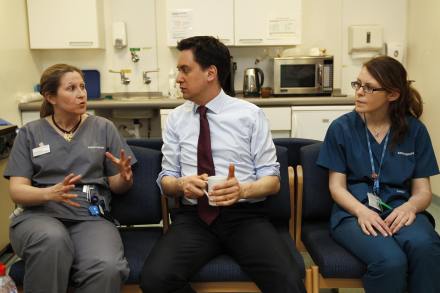

Action over Scotland is certainly producing a reaction in England. It’s not what you’d call an ‘equal and opposite reaction’ yet, but it’s there — and it’s crystallised by Tim Montgomerie’s article for the Guardian this morning. I’d recommend that you read it in full, but Tim’s basic point is that David Cameron could score a ‘triple crown of political victories’ by moving towards a more federal UK: ‘By offering to extend Scottish devolution he can be the Conservative leader who saves the union. By promising to balance Scottish devolution with a commitment to new arrangements for the government of England, he can radically improve his own party’s electoral prospects.
Ah, there he is! With the coalition — and David Cameron — dominating the political news on every day of this half-term week, Ed Miliband has finally caused a ripple in the national consciousness. He’s appearing before nurses in Bolton today to make a pledge: ‘Before he became Prime Minister, David Cameron concealed his plans for creeping privatisation of our National Health Service. So people didn’t get a vote on these plans at the last election. But I give you my word that if he goes ahead, they will be a defining issue at the next.’ Put aside the rhetoric about ‘creeping privatisation’ (which would surely make Tony Blair shudder),
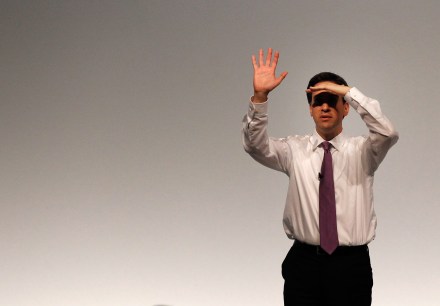
How much does it cost to change a light bulb? Three hundred quid, said David Cameron at PMQs today. Ed Miliband came to the House eager to pile more pressure on the PM and his unloved NHS restructuring plan. Cameron fought back by citing the health bungles Labour presided over while in office. Billions wasted on kaput computers. Hundreds of millions blown on phantom operations. And dead light bulbs that cost more to replace than a week’s holiday in Spain. Cameron’s tactics were better than in previous weeks. Rather than citing some lone wolf medic who supports his reforms he gave us a surprise announcement, albeit unsourced. ‘Ninety-five per cent
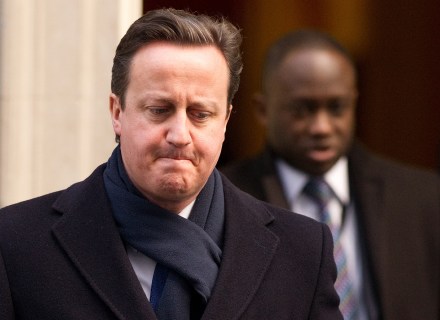
As expected, Ed Miliband went on the NHS and it helped deliver him a points victory. Whenever Miliband raises the issue at PMQs, David Cameron’s rather overly macho body language gives away that he knows he is playing on a sticky wicket. The exchanges today were not particularly enlightening but Miliband had the better of them. There was, though, one effective counter-attack from Cameron where he compared what is happening to the NHS in England to what is happening in Wales where the devolved administration is sticking with the status quo. There’s mileage in this argument if the coalition has the patience to develop it. But part of the problem
PMQs 8 February
The last PMQs before recess gives Ed Miliband a chance to have another go at the coalition’s NHS reforms. I suspect that the ‘Andrew Lansley should be taken out and shot’ quote that appeared in Rachel Sylvester’s column (£) will make an appearance at some point. Miliband will keep going on the NHS because he knows it is one of the Tories’ biggest vulnerabilities and one of the few subjects on which Cameron isn’t confident attacking. Based on past performance, any PMQs where the focus is on NHS reform will produce at least a score draw for the Labour leader. But I still don’t expect Cameron to move

Andrew Lansley should be grateful for small mercies. Rachel Sylvester’s column (£) today may quote a Downing Street source to the effect that ‘Lansley should be taken out and shot’, but there is yet no sign that a hundred Conservative MPs will write to the Prime Minister to say that the Health Secretary’s reforms have to stop. We’ve had such a letter for wind farms and for Europe, but on the NHS it’s not very likely. Most Tory MPs find the NHS a difficult rallying point at the best of times. And these are the worst: they are acutely embarrassed by the car-crash that has been the Health and Social
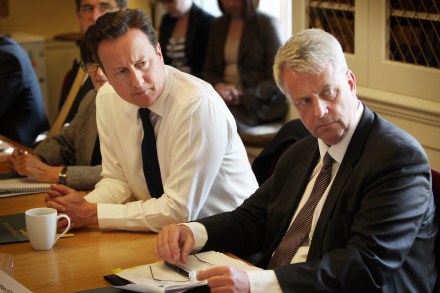
By now, we’re all used to waking up to newspaper columns describing Ed Miliband’s flaws and proclaiming him unfit to lead the Labour party. But today, it’s David Miliband who’s under fire in two articles – one by Roy Hattersley in the Guardian and the other by Matthew Norman in the Telegraph. They’re both in response to the elder Miliband’s New Statesman article, the significance of which Pete wrote about on Thursday. In Hattersley’s case, it’s a direct response, as it is his views that Miliband rejected, labelling them ‘Reassurance Labour’ and saying: ‘The problem with the definition of social democratic politics by the Reassurance Labour tendency is not just

Any CoffeeHousers with a taste for schadenfreude should read David Miliband’s article in the New Statesman. We have to move beyond big government, he declares. We need a growth strategy. I’m not sure if any Labour leader has ever argued otherwise: maybe, as Miliband implies, it has found one now. But, as I ask in my Daily Telegraph column today, what’s worse: a party that’s stuck in 1983, or a modernising movement that’s aiming for 1987? But talk to any Tory, and it’s hard to find any who think the 2015 election is in the bag. Four factors should prevent us from writing off Labour’s chances: 1) David Cameron is
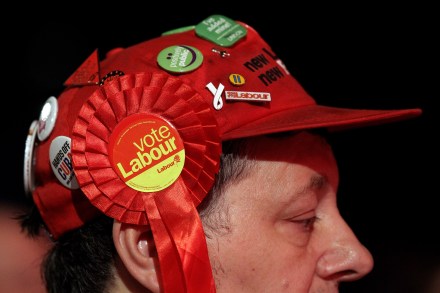
According to Nick Cohen Ed Miliband is Britain’s Greatest Leader of the Opposition. Blimey, that’s quite a statement. He’s a plucky wee chap too: Ed Miliband is a geek, a failure and a loser. All the press says so, so it must be true. Yet the apparent no-hoper retains the ability of the boy who confronted the naked emperor to change the terms of debate. But what debates has he changed? Nick suggests Miliband was brave to stand-up to Rupert Murdoch and that he’s been right to lead the way in banker-bashing. Perhaps so. But few people outside Westminster (and parts of north London) actually care very much, if at

In a speech tomorrow, Ed Miliband will call for ‘one nation banking’. The Labour leader will argue that banks have to show that they are part of the society in which they operate. But, perhaps, most interesting is Miliband’s point — previewed in the political column this week — that the behaviour and pay structures of banks are fair game for parliament because they are ‘either directly or indirectly supported by the taxpayer.’ Labour will, indeed, propose a vote on the broader bonus culture. The clear target of this motion will be Barclays and Bob Diamond. Before the bailouts it would have been easy to dismiss all this

The most curious thing about David Miliband’s article for the latest New Statesman — which is causing quite a stir this morning — is that it should appear now. After all, the Roy Hattersley essay that it purports to be responding to was published, so far as I can tell, last September. That’s five months ago. Which is fine, if it’s really taken MiliMajor that long to get around to it. But it certainly fuels the idea that he has chosen now, this moment, to make a political intervention — and Hattersley is just an excuse. And the intervention itself? Basically, Miliband warns against what he calls ‘Reassurance Labour’, a
Miliband is getting the measure of PMQs. Not with respect to Cameron. With respect to himself. He’s learned that his strongest register — sanctimony — will always ring hollow unless it’s attached to a powerful cause. And his gags don’t work. So he’s ditched his team of funny men and wise-crackers and turned to his political instincts instead. Miliband’s gut worked today. He began with a question which he knew Cameron couldn’t answer. Why hasn’t the government activated the laws requiring banks to name all employees earning over a million year? The PM answered by not answering. He performed a transparent switcheroo from the particular question to the general topic.

As expected, the Tories did everything they could to make the benefit cap the subject of PMQs. One Tory MP managed to slip in a question on it just before Miliband got up, allowing Cameron to press the Labour leader on the issue even before he had started speaking. Tory MPs kept coming back to the benefit cap — there were five questions on it in all — allowing Cameron to repeatedly mock the Labour front bench for not saying what its position is. ‘Just nod — are you with us or against us?’ was one of the lines Cameron tried to goad them with. But in the main clashes

Today’s PMQs will be another skirmish in the battle for fairness. All three parties know that there is no more potent word in British politics at the moment than fairness and they all want to be its champion. But what will make PMQs interesting today is that Cameron and Miliband each have a powerful weapon in the fairness debate, but also a vulnerability. Miliband’s weapon is bankers’ bonuses – the government’s inaction over Stephen Hester’s bonus has given him plenty of material. But he’s acutely vulnerable over the benefits cap. Cameron will be desperate to move the debate onto this territory. All the polling shows that Labour’s desire to have
If you wanted proof that Cameron has softened his stance towards Europe since the hard chill of December, then just look to the Lib Dems. Nick Clegg, unlike then, was sat next to the Prime Minister as he gave his statement to the Commons this afternoon. And the questions that followed from the likes of Menzies Campbell and Simon Hughes were generally warm and approving. Campbell started by, in his words, ‘praising the pragmatism of the PM’. Hughes celebrated a ‘more successful and satisfactory summit than the one in December’. That praise, while friendly enough, creates obvious problems for Cameron — and it was those problems that Ed Miliband sought

Ed Miliband is not naturally a eurospectic, but he certainly sounded like one during his appearance on ITV’s Daybreak show earlier. ‘I’m very concerned about what David Cameron has done,’ he said in reference to the PM’s equivocation over Europe yesterday. ‘He’s sold us down the river.’ Whether this is Miliband committing towards the sort of euroscepticism that is being urged on him by some of his colleagues, it’s too early to say. It’s only words, after all. But my guess is that — just as when Miliband attacked Cameron for not signing up to the latest treaty, but couldn’t say whether he’d have signed it himself — this is
Stephen Hester’s decision to waive his bonus, revealed by Robert Peston just after 10 o’clock, will be a source of great relief to David Cameron and George Osborne. A story that could have dragged on for weeks, undermining their argument about fairness has just lost most of its potency. Ed Miliband, though, will be able to claim — with some justification — that it was the threat of a Commons vote on the matter that led to Hester renouncing his bonus. But this isn’t quite the end of this business. There’s now the question of what happens to the bonuses for other members of staff at RBS and then there